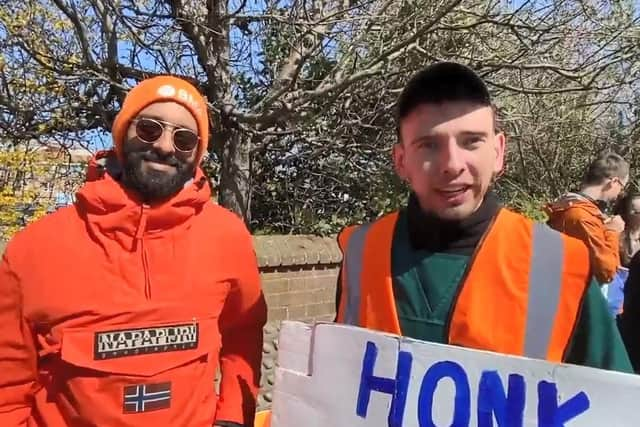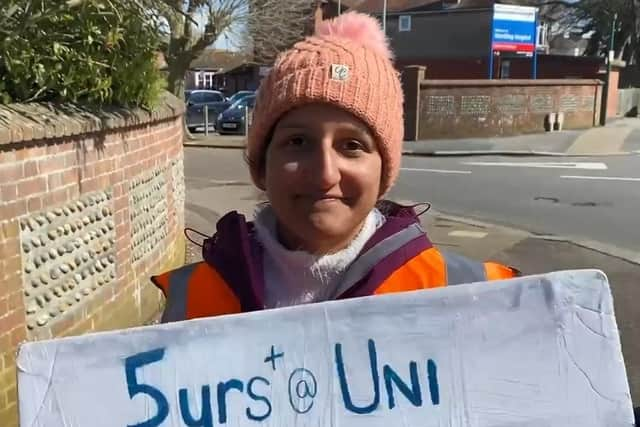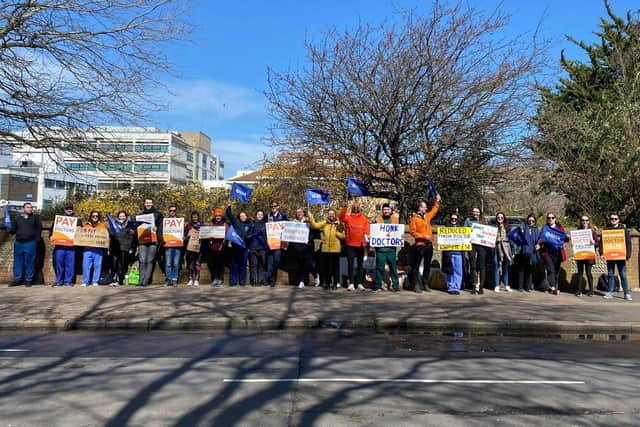Sussex junior doctors' strike: NHS 'on its knees' as university graduates emigrate to Australia and New Zealand for better pay
and live on Freeview channel 276
Junior doctors are taking part in a four-day walkout in Sussex, with England’s top doctor warning that NHS services would see ‘unprecedented disruption’. The second round of strikes started at 7am on Tuesday (April 11) and will continue through until Friday, April 14.
Krupali Patel, a medical registrar, is among those striking outside Worthing Hospital this week.
Advertisement
Hide AdAdvertisement
Hide AdSpeaking to Sussex World on Wednesday (April 12), she said: “I've been a doctor for seven / eight years but I am still counted as a junior doctor as I still have another five years of training to go until I make it into consultancy.


"We are junior doctors for the first 15 years on average after leaving university. Making £14 an hour after gathering 60k in debt is not acceptable.
"This isn't just about pay. The NHS is struggling. It's on its knees, especially post pandemic.
"The nurses are striking, the paramedics are striking because of what the government has done to our NHS. They have cut all of our pay and we are struggling to keep up the good care we want because we do not have enough staff.
Advertisement
Hide AdAdvertisement
Hide Ad"I left university in 2015 – 20 per cent of my year had to go to Australia or New Zealand. The NHS will not continue to survive if they treat staff with such disrespect and don't give us the pay we deserve."


Rumanan Gukathasan, another medical registrar at Worthing Hospital, said the government has cut doctors’ pay in the last 15 years ‘by about 26 per cent’.
"That's the equivalent of working for three months for free,” he said. “Over the years, people have been leaving the health service and seeking other opportunities elsewhere.
“It puts a strain on us and our patients. We have patients on waiting lists for six to 12 months to see doctors in hospital. That's why we're here today."
Advertisement
Hide AdAdvertisement
Hide AdMarc Leach-Tuite, a foundation year two (F2) doctor, said the strikes were vital ‘to restore the pay we deserve; to retain the staff we need to keep the workforce going and keep morale high’.


He said: “We are trying to make it a better NHS for all of us.
“For the most part, everyone is really supportive. We have the public's support.
"Most of the population agree we deserve more than what we are getting. It's nice to hear the horns and see the smiles. People are giving us treats and snacks. We definitely have the public backing."
Advertisement
Hide AdAdvertisement
Hide AdPeople urged to ‘save emergency services for saving lives’ during strike action
The NHS in Sussex is urging those who need urgent medical care that’s not an emergency to ‘save emergency services for saving lives’ over the next few days of the junior doctors’ strike action, and make sure they use the right services for their needs.
An NHS Sussex spokesperson said: “All health services in Sussex are experiencing high levels of demand, and there continues to be a steady rise in people attending emergency departments.
“Easter half term period is traditionally pressured for health services with a four-day bank holiday, and the junior doctor industrial action which is running until this Saturday (April 15) is adding further significant challenges.
Advertisement
Hide AdAdvertisement
Hide Ad“That’s why anyone who needs urgent medical support, but does not have a life-threatening illness or injury, should contact NHS111 first by dialling 111 or going online to www.111.nhs.uk.”
NHS111 is available 24 hours a day and can provide help and support online or over the phone, including connecting callers to pharmacists and out of hours GPs, as well as helping those in need get to the most appropriate service if they do need to see someone face to face.
For those who do need help for urgent care that’s not an emergency, there are alternatives to visiting A&E across Sussex.
There are several walk-in and minor injury services and urgent treatment centres available to help with illness and injury which are urgent but not life threatening:
Advertisement
Hide AdAdvertisement
Hide Ad- Brighton Health Centre walk in service, Brighton Station open 8am-8pm every day;
- Queen Victoria Hospital, East Grinstead, Minor Injury Unit open 8am-8pm every day;
- Crowborough Minor Injury Unit open 8am-8pm every day;
- Uckfield Minor Injury Unit open 8am-8pm every day;
- Lewes Urgent Treatment Centre open 8am-8pm every day;
- Bognor Regis War Memorial Hospital MIU 9am-5pm Monday to Friday;
- Crawley Hospital UTC open 24/7;
- Worthing Hospital Urgent Treatment Centre;
- St Richard’s Hospital Urgent Treatment Centre
The spokesperson for NHS Sussex added: “A&E is for life-threatening emergencies and to provide urgent help for people who may have become seriously ill, for example a stroke or a heart attack, we need to save emergency services for saving lives, especially during the junior doctor strike action.
Advertisement
Hide AdAdvertisement
Hide Ad“Health and care organisations in Sussex are working together to maintain patient safety ,and emergency and critical care will be prioritised and will continue to be available for those who need it, and we need the public to help us by using the right service to meet their needs.”